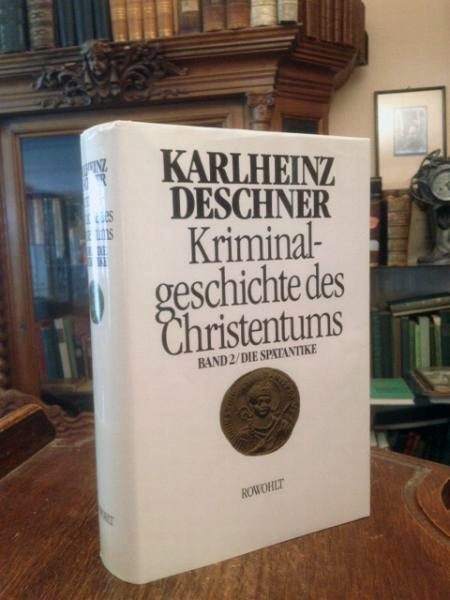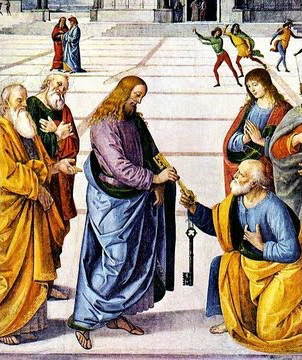 Editor’s Note: The following section comes from the second volume of Deschner’s work (pic left). In the previous instances I had been using the third one but the order I have chosen for this site tries to follow, more or less, the order of what I hope will be the first volume in English of this abridged version of Kriminalgeschichte des Christentums.
Editor’s Note: The following section comes from the second volume of Deschner’s work (pic left). In the previous instances I had been using the third one but the order I have chosen for this site tries to follow, more or less, the order of what I hope will be the first volume in English of this abridged version of Kriminalgeschichte des Christentums.
The envy that I feel for most Westerners is absolute. I was born in the Middle Ages in the sense that, unlike the vast majority of Christians, I got religion inculcated through the hardest psychic blows. A Christian today does not have the remotest idea of what Catholic education was like in other times. Living in Spain, for example, a woman told me that she knew ‘older people’ who feared the idea of eternal damnation: something that younger generations of Christians have been completely spared.
The number of times I heard my Catholic father quote a specific verse from the gospels, ‘Peter: you are a rock, and on this rock I will build my Church!’ (emphasis in my father’s voice) was such, and it made such a dent in my young mentality, that I cannot help feeling great liberation when a non-Christian scholar, like Deschner, debunks those apocryphal verses.
Christianity not only irreparably damaged my life. It is likely that it has irreparably damaged the white race, on which this religion was imposed. Only the outcome of history will show if the white man will get rid of his ethnosuicidal tendencies: a psychic malware programmed, in large part, by the religion that destroyed my life.
Also raised as a Catholic, Deschner wrote:
______ 卐 ______
 Neither Jesus instituted the papacy nor Peter was bishop of Rome
Neither Jesus instituted the papacy nor Peter was bishop of Rome
The Catholic Church bases the foundation of the papacy, and of itself, in the Matthew passage: ‘You are Peter, and on this rock [petrus] I will build my Church’ (Mt 16:18).
In huge golden mosaic letters these words appear, the most discussed of the Bible, in the dome of St. Peter built by Michelangelo. But they are missing in three of the four Gospels, especially in Mark, the oldest of the evangelists. In fact, Jesus never uttered them. This is today ‘the certain outcome of biblical exegesis’ (Brox).
In spite of this, the Catholic Church continues to maintain its ‘divine foundation’. It has no choice: the Church has affirmed it for two thousand years. However, not a few of its theologians capitulate now. Many of them, following with delay the steps of quite conservative Protestants, have developed a language that ‘scientifically’ makes them preserve half the face and allows them not to lose everything before their superiors. They paraphrase the lack of authenticity of the ‘foundational words of the Church’ in the following way: Matthew does not refer to it historically but he composes it theologically. Or they claim the ‘rock’ is a commandment uttered after the ‘resurrection’. The Catholics with fewer detours explain the ‘promise of Peter’ as a later interpolation, simply as an invention of the evangelists.
However, perhaps Peter had a kind of primacy, a certain leading role. But perhaps only temporarily and in certain areas, not, of course, after the ‘council of the apostles’. Paul, who opposes Peter ‘in his face’ in Antioch, insults him by calling him a hypocrite and, in an open manner, questions his demands. Elsewhere in the ‘Holy Scriptures’ there are also ‘anti-Petrine’ tendencies. And that Peter retained his primacy, if he had one, even if it was only an invention of the ‘Petrist party’, does not appear anywhere in the New Testament. Nothing is said.
However, even in the case—which must be excluded for many reasons—that the ‘primacy words’ came from Jesus, the Church could not explain how they were transmitted from Peter to the ‘popes’, since they not only apply to the apostle but also to his ‘successors in office’. Neither the Bible nor any other historical source indicates that Peter appointed his successor.
More than one Catholic ‘sees himself in trouble when trying to explain from a historical and critical point of view the strength of the biblical foundations for the papacy’ (Stockmeier). The most courageous theologians admit that ‘there is nothing’ of a succession of Peter (De Vries), which ‘in the New Testament cannot be seen anywhere’ (Schnackenburg). In effect, the theologian Josef Blank asks himself how primitive Christianity understood this sentence. Did it mean Rome or the primacy of the Roman bishop as successor to the Apostle Peter? ‘The answer is, plain and simple: No!’
Apologetics is based on indications from Jesus to Peter: that he should catch men, that he takes the keys to the kingdom of heaven; that all that he unites or desires on earth will be united or disunited in heaven and finally: ‘Strengthen your brothers’, ‘Feed my flock’. However, many other Gospel or New Testament parallels show that the five dispositions of Jesus were not linked in principle to Peter. And above all, of a successor, even of a superior of the Roman community as director of a global Church, it is not spoken at all in any early Christian text.
______ 卐 ______
Liked it? Take a second to support this site.
7 replies on “Christianity’s Criminal History, 90”
Have you read “50 Years in the Church of Rome” by Charles Chiniquy.
He discusses Papal Primacy. He quotes one of the Church Father’s in saying that a Bishop who would pretend to Universal Jurisdiction would be a forerunner to Antichrist.
One of the reasons why I want to become fluent in Latin in the next year or two: I want to read this multi-volume collection of Patristic Writings that Chiniquy mentions in his book.
This quote is one of the reasons why I cannot help but respect the Office of Pontifex Maximus (Pagan) High Priest of Rome. The Pope could become “Antichrist” and “an implacable enemy of the Gospel”, one day, just as he was prior to the invention of Pauline Christianity.
Cesar, I sympathise with you! I doubt that I would have not had so much psychopathic violence inflicted upon me by my father were it not for the Biblical teachings that praise such behaviour.
I hate the Vatican-II sect specifically because it is my father’s religion.
Jorge Bergoglio is in Ireland. He profanes this land with his foul presence.
IMO Pope Francis is the epitome of the gospel message, as St Francis is his inspiration.
Only by transvaluing values can the white man finally see that St Francis’ message was not good at all!
I sometimes wonder what Europe would have been like had the Stalinist faction won: the faction of Jesus, Peter and James; the Christianity-in-one-country faction.
Instead the Trotskyite Internationalist faction: the faction of Saint Paul, prevailed.
I like to call the “Stalinist Faction” the Jacobite Faction, because it was led by Saint James, the “brother” of Jesus. One would think that Christ’s brother would know what Christ wanted better than Saint Paul who never met Christ.
Had the Jacobite Faction won, Europe would have been spared the pestilence of Christianity. This contagion would have never left the Levant.
Is there a parallel universe where Saint Paul never had a stroke, and fallen of a horse and hallucinated the risen Christ, in which Europe was never Christian?
Without Christianity, whites would be in much better shape today. What I dislike in WN is that compared to the JQ, the CQ a sort of taboo topic, at least in the main sites, podcasts and webzines.
“Is there a parallel universe where Saint Paul never had a stroke, and fallen of a horse and hallucinated the risen Christ, in which Europe was never Christian?”
Or where Charles Martel was defeated? See my response in The Antichrist § 9 thread below to find out Hitler’s speculation on this. I have to wonder what he would have thought if he could see the Islamization of Europe today. Would he say that in the long run, it’s a good thing?
Nobody is perfect. Not even the Führer. Only idiots like Thordaddy at Occidental Dissent talk constantly about ‘the Perfect Man’ (Jesus).
Southern nationalists are apparently ethnosuicidal…
Hitler’s opinion would be interesting because it is Hitler, more than anyone else, who defined National Socialism. He appears to have thought that even though an Islamic victory would not have been without cost, the cost would have been worth it to get rid of Christianity. In this one respect, I can’t say he was wrong. But, according to Speer, he also seems to have thought that if victorious, the Arabs wouldn’t have remained in Europe, being unable to tolerate the climate. As we know now, that is not true. Besides making the transmigration of peoples from diverse parts of the globe into a reality, another side effect of technological “advance” is the nullification of natural factors such as climate. The entire world has become just an open-air shopping mall, with nations turned into retail outlets within the mall. Global citizens are rapidly shuttled from one store to another as economic need dictates, and climate is no longer much of a factor. The genetic destruction of race this is bringing about will likely be permanent.